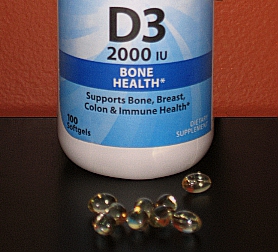Vitamin D and Aging: The Sunshine Vitamin May Help You Live Longer
When a blood test revealed my vitamin D deficiency, I wasn't completely surprised. I live at a latitude where it's hard to get sufficient vitamin D from sunshine. I was surprised, however, when my doctor suggested a daily supplement of 2,000 IU of vitamin D3.

I like my doctor, and I'm very happy with the care I get from her, but I also believe in being an active participant in my own heath care. Before I put 2000 units of anything in my body on a daily basis, I want to know more about it. I've learned that vitamin D is far more important than most of us realize, especially as we grow older.
Vitamin D Deficiency
According to some doctors, vitamin D deficiency is a widespread problem. Dr. Michael F. Holick, director of the Vitamin D, Skin and Bone Research Laboratory at Boston University School of Medicine, says: "we estimate that vitamin D deficiency is the most common medical condition in the world."[13]
There is also growing evidence linking this deficiency to a wide range of ailments that can affect both the length and quality of our lives.

Vitamin D and Osteoporosis
Vitamin D is best known for its role in bone health. Because vitamin D helps your body absorb calcium, a vitamin D deficiency can lead to reduced bone density, or osteoporosis. This makes bone fractures more likely as you age. In cases of extreme deficiency, a painful softening of the bones (osteomalacia) can result, although this is rare.[2]
In addition to making your bones stronger, vitamin D can also increase muscle strength, which can help protect the elderly from injuries suffered due to falling.[11]
In the picture below, the portion of the US above the blue line does not get enough sun for adequate year-round production of vitamin D. There's no specific boundary between the two regions, of course, but the 37th parallel (a line of latitude) is often used to approximate the cutoff point.

Vitamin D and Cancer
Studies have shown increased occurrences of certain cancers in northern regions, where exposure to sunlight is reduced (see sidebar). Colon cancer, breast cancer, and prostate cancer are among those with higher mortality rates at these higher latitudes.[3]
One hypothesis is that low levels of vitamin D may be the cause. This is supported by studies showing that instances of these cancers decrease with higher blood levels of vitamin D. Other studies show increased survival rates among cancer patients with higher levels of vitamin D.[4,5]
Vitamin D and Heart Disease
Low levels of vitamin D have been linked to an increased risk of cardiovascular disease. When patients with vitamin D deficiency used supplements to raise their vitamin D levels, these risks, including the risk of heart failure, heart attack and stroke, went down. This is significant because not all studies that look at blood levels of vitamin D also look at the effects of using supplements to raise levels.[6]
The Importance of Vitamin D
Vitamin D and Your Immune System
Researchers have discovered that vitamin D plays an important role in the functioning of the immune system. Deficiencies have been linked to autoimmune diseases and reduced resistance to infection. A higher mortality rate among pneumonia patients with vitamin D deficiency has been seen. Vitamin D may even help ward off colds, the flu and other respiratory infections.[7,10,11]
Other Benefits of Vitamin D
There is growing evidence that vitamin D deficiency may play a role in a number of other ailments, many of which are of increasing concern as we get older. Among these are type 2 diabetes, arthritis, high blood pressure, depression, and more.[9]

International Units (IU)
Vitamins and other agents, such as hormones and vaccines, are measured in international units (IU). IUs measure the biological effect of a substance, which is a more important measurement to doctors and other medical professionals than mass or weight.
How Much Vitamin D Do You Need?
The Institute of Medicine's Recommended Daily Allowance for vitamin D is 600 IU up to age 70, and 800 IU daily after age 70. However, the Harvard School of Public Health believes that this amount is inadequate. They suggest a daily supplement of 1,000 IU, or 2,000 IU daily for people at high risk of vitamin D deficiency.[11]
These levels are well below the Institute of Medicine's Upper Level Intake (ULI) of 4,000 IU. The ULI is what they believe to be the upper limit of what can be taken daily without negative consequences. Based on this information, I am quite comfortable with my doctor's recommendation of 2,000 IU daily.

Sources of Vitamin D
Vitamin D can be obtained from three sources:
- The Sun: The primary natural source of vitamin D for humans is the sun. Some researchers suggest that sun exposure twice a week, for 5 to 30 minutes, on the face, arms, legs or back is sufficient. Of course, the dangers of overexposure are well-known, and, as noted previously, it is difficult to produce enough vitamin D from the sun at certain latitudes.[1]
- Food: Very few foods naturally contain vitamin D, making it difficult to get sufficient amounts from diet alone. The best sources of vitamin D are fatty fish, such as swordfish, salmon and tuna. Some foods, such as milk and orange juice, can be found fortified with vitamin D.[1]
- Supplements: For many people, supplements are the only reliable means of getting enough vitamin D. Supplements are available in two forms, D2 and D3. Which one should you take? Some studies have found that D3 seems to be more effective. The evidence is inconclusive, but my doctor recommends D3 supplements.[12]


Read this - it's important: I'm not a doctor, and this article is intended to be informational, not a substitute for medical advice from a physician. Do not make decisions about your health based on this article. Everyone's situation is different. Do some research (the sources I learned from are listed below), and then talk to your doctor before adding vitamin D (or any other supplement) to your diet.

References
- [1] Office of Dietary Supplements. Vitamin D - Health Professional Fact Sheet. http://ods.od.nih.gov/factsheets/VitaminD-HealthProfessional/
- [2] National Osteoporosis Foundation. Vitamin D and Bone Health. http://www.nof.org/aboutosteoporosis/prevention/vitamind
- [3] American Journal of Clinical Nutrition. Sunshine and vitamin d for bone health and prevention of autoimmune diseases, cancers, and cardiovascular disease. http://www.ajcn.org/content/80/6/1678S.long
- [4] Vitamin D Council. Health Conditions - Cancer. http://www.vitamindcouncil.org/health-conditions/cancer/
- [5] Science Daily. Vitamin D linked to lung cancer survival, study suggests. http://www.sciencedaily.com/releases/2011/03/110301111656.htm
- [6] WebMD. Vitamin D Supplements Lower Heart Disease Risk. http://www.webmd.com/heart-disease/news/20100315/vitamin-d-supplements-lower-heart-disease-risk
- [7] PubMed. Vitamin D and the immune system. http://www.ncbi.nlm.nih.gov/pubmed/21527855
- [8] Science Daily. Vitamin D accelerates recovery from tuberculosis. http://www.sciencedaily.com/releases/2011/01/110105194842.htm
- [9] New York Times. Reasons That Vitamin D May Matter. http://well.blogs.nytimes.com/2012/03/12/reasons-to-place-a-bet-on-vitamin-d/
- [10] Science Daily. Vitamin D deficiency in pneumonia patients associated with increased mortality. http://www.sciencedaily.com/releases/2011/05/110510101623.htm
- [11] Harvard School of Public Health. Vitamin D and Health. http://www.hsph.harvard.edu/nutritionsource/what-should-you-eat/vitamin-d/index.html#vitamin-d-recommendations
- [12] About.com Nutrition. Which Form of Vitamin D is Better, D2 or D3?. http://nutrition.about.com/od/therapeuticnutrition1/f/D2orD3.htm
- [13] ABC News. 6 Million U.S. Kids Lack Enough Vitamin D. http://abcnews.go.com/Health/Healthday/million-us-kids-lack-vitamin/story?id=8917392&page=2#.T38VSNWfiVo









